**** **** **** **** **** **** ****
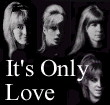

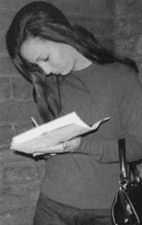 Julie Felix was born in Santa Barbara, California on June 14th, 1938 into a spiritual background of mixed cultures. Her father was Mexican and her mother an American of Welsh ancestry, but both had American Indian blood in their veins which Julie feels deeply connected to. "The American Indian which I get through my mother and my father. This wonderful connection to the land." Her father, "an excellent musician", taught her how to play guitar, and at the age of seven she wrote her first song which she says was "about a pixie."
Julie Felix was born in Santa Barbara, California on June 14th, 1938 into a spiritual background of mixed cultures. Her father was Mexican and her mother an American of Welsh ancestry, but both had American Indian blood in their veins which Julie feels deeply connected to. "The American Indian which I get through my mother and my father. This wonderful connection to the land." Her father, "an excellent musician", taught her how to play guitar, and at the age of seven she wrote her first song which she says was "about a pixie."
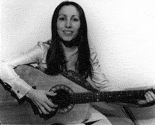 She was a very strong willed young lady who fought fiercely throughout her life to promote causes she felt to be important, using her musical career as a way of doing this. "As a musician, I felt kind of like a troubadour - someone to spread the news. I feel all artists have the ability, if not the responsibility, to spotlight certain areas in our cultures that need balancing." During a tour of Kenya and Uganda in Africa she worked for both the charities Christian Aid and Freedom From Hunger. Years later she performed to promote Women's Rights and made appearances at Environmental Benefits.
She was a very strong willed young lady who fought fiercely throughout her life to promote causes she felt to be important, using her musical career as a way of doing this. "As a musician, I felt kind of like a troubadour - someone to spread the news. I feel all artists have the ability, if not the responsibility, to spotlight certain areas in our cultures that need balancing." During a tour of Kenya and Uganda in Africa she worked for both the charities Christian Aid and Freedom From Hunger. Years later she performed to promote Women's Rights and made appearances at Environmental Benefits.

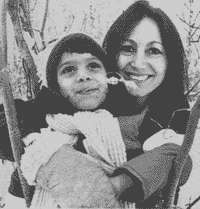 In 1971 her campaigning continued when she sang to a record breaking 27,000 people at New Zealand's Western Springs in order to urge the Kiwis not to engage in conscription for the Vietnam war. On December 19th of that year she gave birth in London to her first child, a daughter named Tanit Alexandra Teresa Guadalupe whom she brought up as a single parent long before the idea bcame socially acceptable. "I didnít tell my mother I was pregnant, and she hasnít forgiven me for that. I called her up after Tanit was born on December 18, and told her she had her first granddaughter."
In 1971 her campaigning continued when she sang to a record breaking 27,000 people at New Zealand's Western Springs in order to urge the Kiwis not to engage in conscription for the Vietnam war. On December 19th of that year she gave birth in London to her first child, a daughter named Tanit Alexandra Teresa Guadalupe whom she brought up as a single parent long before the idea bcame socially acceptable. "I didnít tell my mother I was pregnant, and she hasnít forgiven me for that. I called her up after Tanit was born on December 18, and told her she had her first granddaughter."
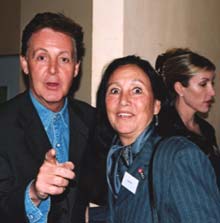 Julie had always felt deeply about the effect of military agression in Third World countries, but when she saw pictures of HRH Princess Diana in Angola's minefields she was deeply moved and added campaigns against landmines to her long list of causes she had a passion for. "The more I discovered, the more dedicated I became. It put in focus a great waste of life. These minefields remain long after the wars are over. Countries most affected are the poorest and, within them, the poorest sections of communities are affected. These mines are a great scar on the conscience of the world, and we are allowing it to continue." She works closely with Adopt A Minefield whose patrons are her ex-beau Paul McCartney and his wife Heather, works with her longtime friend and legendary ex-Zeppelin guiarist John Paul Jones for the Mines Advisory Group, and hosted a Guitars Against Landmines concert in Manchester during January 2002.
Julie had always felt deeply about the effect of military agression in Third World countries, but when she saw pictures of HRH Princess Diana in Angola's minefields she was deeply moved and added campaigns against landmines to her long list of causes she had a passion for. "The more I discovered, the more dedicated I became. It put in focus a great waste of life. These minefields remain long after the wars are over. Countries most affected are the poorest and, within them, the poorest sections of communities are affected. These mines are a great scar on the conscience of the world, and we are allowing it to continue." She works closely with Adopt A Minefield whose patrons are her ex-beau Paul McCartney and his wife Heather, works with her longtime friend and legendary ex-Zeppelin guiarist John Paul Jones for the Mines Advisory Group, and hosted a Guitars Against Landmines concert in Manchester during January 2002.
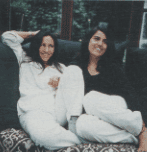 Recently she has been celebrating forty years as a UK television and recording artist by planning a tour which reaches well into the year 2004. Details of her tour can be found on her Official Website. Her music is still her way of conveying her feelings on important issues within her life, and she puts great importantce on making sure that this comes before all else in her music. She knows she has to keep up with the times and make her message clear. "Everything I sing about today is about now, not remember the good old days. That's not to say that I don't sing songs from the past. Dylan's Masters of War could hardly be more current. I was tagged a political and protest singer, which is still true. But I believe that my spiritual and emotional side has come more into focus over the years... Right now, I am dealing with issues like Iraq and so on and don't want to be stuck in a groove. I hope I am very NOW." She made a major stance for peace yet again when she joined the London peace march on 15 February 2003. Her guitar went along with her to both the march and the London Mayor's Peace Reception where she sang Masters of War and rejoiced in the words of her 1960s contemporaries:
Recently she has been celebrating forty years as a UK television and recording artist by planning a tour which reaches well into the year 2004. Details of her tour can be found on her Official Website. Her music is still her way of conveying her feelings on important issues within her life, and she puts great importantce on making sure that this comes before all else in her music. She knows she has to keep up with the times and make her message clear. "Everything I sing about today is about now, not remember the good old days. That's not to say that I don't sing songs from the past. Dylan's Masters of War could hardly be more current. I was tagged a political and protest singer, which is still true. But I believe that my spiritual and emotional side has come more into focus over the years... Right now, I am dealing with issues like Iraq and so on and don't want to be stuck in a groove. I hope I am very NOW." She made a major stance for peace yet again when she joined the London peace march on 15 February 2003. Her guitar went along with her to both the march and the London Mayor's Peace Reception where she sang Masters of War and rejoiced in the words of her 1960s contemporaries:
"Come you Masters of War, You that build the big guns, You that build the death planes,
You that build the bombs. You that hide behind walls, You that hide behind desks.
I just want you to know, I can see through your masks." Bob Dylan
"When you dream a dream alone, it is a dream.
When you dream a dream together, it is reality." Yoko Ono.
SOURCES: various books and magazines about the 1960s music scene, interviews in various publications and Julie's Official Website.

